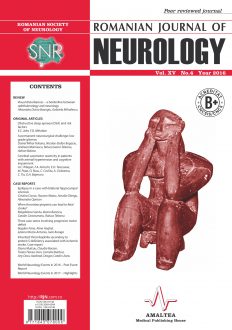SELECT ISSUE

Indexed

| |

|
|
|
| |
|
|
|

|
|
|
|
|
|
| |
|
|
HIGHLIGHTS
National Awards “Science and Research”
NEW! RJN has announced the annually National Award for "Science and Research" for the best scientific articles published throughout the year in the official journal.
Read the Recommendations for the Conduct, Reporting, Editing, and Publication of Scholarly work in Medical Journals.
The published medical research literature is a global public good. Medical journal editors have a social responsibility to promote global health by publishing, whenever possible, research that furthers health worldwide.
INHERITED THROMBOPHILIA SECONDARY TO PROTEIN S DEFICIENCY ASSOCIATED WITH ISCHEMIC STROKE. CASE REPORT
Diana Matcau, Claudia Barsan, Traian Flavius Dan, Camelia Barbusi, Any Docu Axelerad and Dragos Catalin Jianu
ABSTRACT
Thrombophilia is characterized by an increased tendency to arterial and venous thrombus formation. Inherited thrombophilia can be secondary to protein S deficiency. Concomitant use of oral contraceptive pills increases the risk of venous thromboembolism and arterial thrombosis. We report a case of a 34-year-old female who used oral contraceptive pills for many years, who developed acute ischemic stroke of right occipital lobe with secondary left superior homonymous quadrantanopia. We have run several tests to establish the ischemic stroke etiology: unenhanced brain and cervical spine computed tomography, brain magnetic resonance imaging and magnetic resonance angiography (including MR venography), computed tomographic angiography, echocardiography, extracranial duplex ultrasound and laboratory data (including thrombophilia testing). The laboratory investigations confirmed that the ischemic stroke of our patient resulted from a severe inherited thrombophilia secondary to protein S deficiency.
Keywords: ischemic stroke, thrombophilia, protein S, contraceptive pills
Full text | PDF
